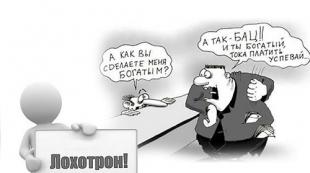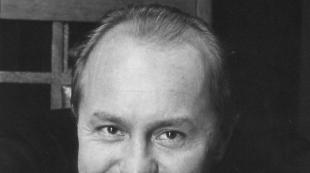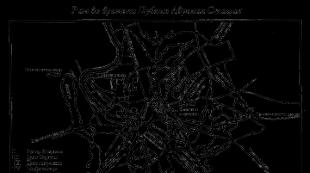Types of emotional states. higher feelings
Throughout the centuries of history, the study of emotional states has received the closest attention, they have been assigned one of the central roles among the forces that determine inner life and human actions.
The development of approaches to the study of emotional states was carried out by such psychologists as W. Wundt, V. K. Vilyunas, W. James, W. McDougall, F. Kruger.

W. Wundt
 V.K.Vilyunas
V.K.Vilyunas

W. McDougall
Teachings about feelings or emotions is the most undeveloped chapter in psychology. This is the side of human behavior that is more difficult to describe and classify, and also to explain by some kind of laws.
In modern psychological science distinguish the following types and forms of experiencing feelings:
- Moral.
- Intelligent.
- Aesthetic.
- subject.
moral feelings- these are feelings in which a person's attitude to the behavior of people and to his own is manifested. Moral feelings are alienation and affection, love and hatred, gratitude and ingratitude, respect and contempt, sympathy and antipathy, a sense of respect and contempt, a sense of camaraderie and friendship, patriotism and collectivism, a sense of duty and conscience. These feelings are generated by the system of human relations and the aesthetic norms that govern these relations.
Intellectual Feelings arise in the process of mental activity and are associated with cognitive processes. It is the joy of searching when solving a problem or a heavy feeling of dissatisfaction when it is not possible to solve it. Intellectual feelings also include the following: curiosity, curiosity, surprise, confidence in the correctness of the solution of the problem and doubt in case of failure, a sense of the new.

aesthetic feelings- this is a feeling of beauty or, on the contrary, ugly, rude; a feeling of greatness or, conversely, meanness, vulgarity.

Object feelings- feelings of irony, humor, a sense of the sublime, tragic.

Attempts to give more universal classifications of emotion were made by many scientists, but each of them put forward his own basis for this. So, T. Brown put the sign of time as the basis for classification, dividing emotions into immediate ones, that is, manifested "here and now", retrospective and prospective. Reed built a classification based on the relationship to the source of the action. I. Dodonov in 1978 notes that it is impossible to create a universal classification in general, therefore a classification suitable for solving one range of problems turns out to be ineffective for solving another range of problems

Emotions - (French emotion, from Latin emoveo - shake, excite) - a class of mental states and processes that express in the form of direct biased experience the meaning of reflected objects and situations for meeting the needs of a living being.
Emotion is a general, generalized reaction of the body to vital influences.
The class of emotions includes moods, feelings, affects, passions, stresses. These are the so-called "pure" emotions. They are included in all mental processes and human states. Any manifestations of his activity are accompanied by emotional experiences.

Of greatest importance is the division of emotions into higher and lower.
Higher (complex) emotions arise in connection with the satisfaction of social needs. They appeared as a result public relations, labor activity. Lower emotions are associated with unconditioned reflex activity, based on instincts and being their expression (emotions of hunger, thirst, fear, selfishness).
Of course, since a person is an inseparable whole, the state of the emotional body directly affects all other bodies, including the physical one.
In addition, emotional states (more precisely, the states of the emotional body) can be caused not only by emotions. Emotions are pretty fleeting. There is an impulse - there is a reaction. There is no impulse - and the reaction disappears.

Emotional states are much more permanent. The reason for the current state may disappear long ago, but the emotional state remains and sometimes lingers for a long time. Of course, emotions and emotional states are inextricably linked: emotions change emotional states. But emotional states also affect emotional reactions, and in addition they affect thinking (i.e. mind). In addition, feelings contribute: they also change the emotional state. And since people often confuse where feelings are and where emotions are, then a simple process in general turns into something difficult to understand. Rather, this is not difficult to understand - it is difficult to put it into practice without preparation, and therefore (including therefore) people sometimes have difficulties with managing their emotions and emotional states.

It is possible to suppress an emotional state by an effort of will - this is the very suppression that is harmful, according to psychologists, all the more harmful both for a person and as a parent. You can switch yourself: artificially evoke in yourself (or attract from outside) some other impulse - react to it in some previously known way - a new emotion will add its stream and lead to a different emotional state. You can do nothing at all, but focus on living the current emotional state (this approach is mentioned in Buddhism and Tantra). This is nothing new, and we learn to suppress emotional states from childhood, considering this process the control of emotions ... but this is not true. Still, this is the control of emotional states, and with its help it is impossible to control emotions themselves.

And this is where the confusion appears: a person thinks that he is trying to control emotions - but he does not work with emotions. In reality, a person is trying to work with the consequences of emotions; but since he does not touch on the causes of his emotional state, his attempts will certainly be ineffective (of course, if he does not work with himself and in terms of choosing emotions) - in terms of emotional states, the difficulty is that our current state is the result of several different reasons, diverse reasons. Therefore, it is difficult to choose an intelligent method of self-regulation (especially if only emotions are taken into account and other areas of the psyche are not taken into account). However, it seems that with a sufficiently developed will, it is easier to work with one's own emotional states. Well, you should not lose sight of the fact that the causes from the sphere of feelings are weakly amenable to control and observation, at least at first.

Thus, there are a great many approaches to the classification and definition of emotions, emotions accompany all manifestations of the body's vital activity and perform important functions in the regulation of human behavior and activities:
· signaling function(signal about a possible development of events, a positive or negative outcome)
· estimated(assesses the degree of usefulness or harmfulness to the body)
· regulating(based on the received signals and emotional assessments, he chooses and implements ways of behavior and actions)
· mobilizing And disorganizing
adaptive the function of emotions is their participation in the process of learning and gaining experience.
The main emotional states distinguished in psychology:
1) Joy (satisfaction, fun)
2) Sadness (apathy, sadness, depression)
3) Fear (anxiety, fear)
4) Anger (aggression, anger)
5) Surprise (curiosity)
6) Disgust (contempt, disgust).
Arising from the interaction of the organism with the environment positive emotions contribute to the consolidation of useful skills and actions, and negative ones make you shy away from harmful factors.
What emotions and emotional state are you experiencing lately?
Classification of emotional states. Emotional states have very different manifestations. In terms of intensity and
duration, they can be long, but weak (sadness), or strong, but short-lived (joy).
According to the subjective experience, the whole variety of emotions can be divided into 2 categories: positive emotions associated with the satisfaction of a person’s vital needs and therefore giving pleasure, and negative emotions associated with the dissatisfaction of vital needs and therefore causing displeasure. According to the content, emotions can be classified into simple and complex, depending on what level of needs are satisfied in a person. The simpler ones include anger, fear, joy, grief, envy, jealousy, while the more complex ones include a moral feeling, an aesthetic feeling, a feeling of patriotism, etc.
Finally, according to the form of flow, all emotional states are divided into sensual tone, mood, emotions, affect, stress, frustration, passion, higher feelings.
Sensual tone. simplest form emotional experience - this is the so-called sensual, or emotional, tone. Under the sensual tone is understood the emotional coloring of the mental process, prompting the subject to preserve or eliminate it. It is well known that certain colors, sounds, smells, by themselves, regardless of the memories associated with them, can cause us a pleasant or unpleasant feeling. So, good music, the smell of a rose, the taste of an orange are pleasant, have a positive emotional tone. If the negative sensual tone turns into a painful disgust, then one speaks of idiosyncrasy.
Sensual tone, as it were, accumulates in itself a reflection of useful and harmful factors of the surrounding reality. Due to its generality, the feeling tone helps to make a preliminary and quick decision about the meaning of a new stimulus, instead of comparing it with all the information stored in memory. Sensual tone is often subjective and depends on how the activity proceeds: a partner who constantly loses to us seems more attractive than one who wins us all the time. Despite its external insignificance, knowledge and purposeful use of sensual tone allows you to influence a person’s mood, improve labor productivity, study intensity, etc.
Mood. Mood is understood as a general emotional state that colors all human behavior for a long time. Mood is an emotional reaction not to immediate events, but to their significance for a person in the context of his general life plans. This is not a special experience, timed to coincide with some particular event, but a diffuse, general state.
The mood is very diverse and can be joyful or sad, cheerful or depressed, cheerful or depressed, calm or
irritated, etc. The reasons for this or that mood are not always clear to the person experiencing them. No wonder they talk about unaccountable sadness, causeless joy, and in this sense, mood is an unconscious assessment by a person of how favorable circumstances are for her. But this reason is always there and can be determined. It can be the surrounding nature, events, activities performed. The mood significantly depends on the general state of health, on the work of the endocrine glands and, especially, on the tone of the nervous system.
Moods can vary in duration. The stability of mood depends on many reasons: the age of a person, the individual characteristics of his character and temperament, willpower, the level of development of the leading motives of behavior.
A prolonged mood can color a person's behavior for days or even weeks. Mood can become a stable personality trait - on this basis, people are divided into optimists and pessimists.
At the same time, the mood can be of a short-term nature, which is especially pronounced in childhood. Without an established hierarchy of motives, children are easily amenable to mood changes: any emotional impression gives rise to unstable, variable, capricious moods. With age, the mood becomes more stable - significant influences for the personal sphere cause a change in mood.
Emotions. Emotions are the immediate, temporary experience of some feeling. So, for example, the feeling of love for football is not an emotion. Emotions will be represented in the stadium by the state of admiration that the fan feels when watching good game athletes or the emotion of indignation, indignation at a lazy game or inexperienced refereeing.
Emotions can be triggered by both real and imaginary situations, are able to anticipate events that have not actually occurred yet, and arise in connection with ideas about previously experienced or imaginary situations.
From the point of view of influence on human activity, emotions are divided into sthenic and asthenic. Euphoria, mania, anger, anxiety are among the sthenic (or "hypersthenic") emotions; among the "asthenic" - sadness, melancholy, apathy, fear.
Stenic emotions stimulate human activity, encourage him to actions, statements. And, conversely, asthenic emotions are characterized by stiffness, passivity. Therefore, depending on the individual characteristics of a person, emotions can affect behavior in different ways. Thus, in a person experiencing feelings of fear, an increase in muscular strength is possible and he can rush towards danger. The same feeling of fear can cause a complete breakdown, fear can "bend your knees." Grief can
cause apathy, inactivity in a weak person, while a strong person doubles his energy, finding solace in work and creativity.
Emotional experiences can be ambiguous, contradictory. This phenomenon is called ambivalence (duality) of feelings. Usually, ambivalence is caused by the ambiguity of the object itself (for example, you can respect someone for their ability to work and at the same time condemn them for their temper). Ambivalence can also be generated by a contradiction between stable feelings towards an object and situational emotions (for example, love and hate are combined in jealousy).
The basic, fundamental emotions include pleasure, joy, suffering, surprise, disgust, anger, contempt, shame, interest, fear.
The oldest in origin, the simplest and most common form of emotional experience among living beings is the pleasure derived from the satisfaction of organic needs (or the displeasure associated with the dissatisfaction of organic needs). Almost all organic sensations have their own emotional tone. The close connection that exists between emotions and the activity of the body is evidenced by the fact that any emotional state is accompanied by many physiological changes in the body.
Joy is a positive emotional state associated with the ability to sufficiently fully satisfy an urgent need, the probability of which up to this point was small or uncertain.
Suffering - a negative emotional state associated with the information received about the impossibility of satisfying the most important vital needs, which up to this point seemed more or less likely, most often occurs in the form of emotional stress.
Surprise is an emotional reaction that does not have a clearly expressed positive or negative sign to sudden circumstances. Surprise inhibits all previous emotions, directing attention to the object that caused it, and can turn into interest.
Disgust - a negative emotional state caused by objects, contact with which conflicts with
ideological, moral or aesthetic principles of the subject. Disgust, when combined with anger, can motivate aggressive behavior in interpersonal relationships.
Anger is a negative emotional state that proceeds in the form of an affect and is caused by the sudden appearance of a serious obstacle to satisfying an extremely important need for the subject.
Contempt is a negative emotional state that occurs in interpersonal relationships and is generated by a mismatch between the life positions of the subject and the life positions of the object of feeling. The latter are presented to the subject as base, not corresponding to accepted moral standards and aesthetic criteria.
Shame is a negative emotional state, expressed in the awareness of the inconsistency of one's own actions and appearance with the expectations of others or one's own ideas about appropriate behavior and appearance.
Interest (as an emotion) is a positive emotional state that promotes the development of skills and abilities, the acquisition of knowledge, and motivates learning.
Fear is a negative emotional state that appears under the influence of information about a possible real or imagined danger. In contrast to the emotion of suffering, caused by direct blocking of the most important needs, the emotion of fear is caused only by a probabilistic forecast of possible trouble.
Each of these emotions can be manifested by a whole range of states that differ in severity (for example, joy can be manifested by satisfaction, delight, exultation, ecstasy, etc.).
From the combination of fundamental emotions arise such complex emotional states as, for example, anxiety, which can combine fear, anger, guilt and interest.
Affect. In critical conditions, when the subject is unable to find a quick way out of a dangerous situation, a special kind of emotional processes arises - affect. This is the most powerful of the considered emotional reactions. Affect
- a strong and short-term emotional state, accompanied by pronounced motor manifestations and a change in the functions of internal organs.
Any feeling can be experienced in an affective form. This includes cases of affective delight at the performance of a favorite ensemble, and affective anger of fans at the stadium, and religious ecstasy, etc. Sometimes the affect is manifested in the intense stiffness of movements, posture, speech. Such can be horror, despair. Or, if a person suddenly receives good news, he is lost, does not know what to say.
One of the essential functions of affect is that it represents stereotyped actions fixed in evolution, a way of “emergency” resolution of situations: flight, stupor, aggression, etc.
Affect arises as a result of an already committed action and expresses its subjective emotional assessment in terms of achieving the set goal. The development of an affect obeys the following law: the stronger the initial motivational stimulus of behavior and the more efforts had to be expended to implement it, the smaller the result obtained as a result of all this, the stronger the affect that arises.
The cause of affect can be a conflict, a contradiction between a person’s strong desire for something and the objective impossibility to satisfy the impulse that has arisen, and the person is not able to realize this impossibility or cannot reconcile with it (anger, rage). The conflict may also lie in the increased demands placed on a person in this moment, and his experiences, lack of confidence in their abilities, underestimation of their capabilities.
A distinctive feature of affect is the weakening of conscious control, the narrowness of consciousness. Affects, as a rule, interfere with the normal organization of behavior, its rationality. At the same time, thinking changes, a person loses the ability to foresee the results of his actions. In an affect, a person, as it were, loses his head, his actions are unreasonable, performed without regard to the situation. Losing power over himself, a person, as it were, surrenders entirely to experience.
In addition, the main characteristics of attention change, only those objects that correspond to experiences are kept in the field of perception. All other stimuli are insufficiently realized, and this is one of the reasons for the practical uncontrollability of this state.
Affects are able to leave strong and lasting traces in long-term memory. In contrast to affects, the work of emotions and feelings is associated primarily with short-term and short-term memory. The affect arises sharply, suddenly in the form of a flash, accompanied by a strong and erratic motor activity, there is a kind of discharge in action. Emotional tension accumulated as a result of affective situations can be summed up and lead to a strong and violent emotional discharge, which, relieving tension, often leads to a feeling of fatigue, depression, and depression.
emotional stress. Emotional stress is
a state of excessively strong and prolonged psychological stress that occurs in a person when his nervous system receives an emotional overload. Emotional stress appears in situations of threat, danger, resentment, etc. Stress disorganizes human activity, disrupts the normal course of his behavior. Stress, especially if it is frequent and prolonged, has a negative impact not only on the psychological state, but also on the physical health of a person. They are the main "risk factors" in the appearance and exacerbation of diseases such as cardiovascular and gastrointestinal diseases.
G. Selye identified 3 stages in the development of stress. The first stage is the alarm reaction - the phase of mobilization of the body's defenses, which increases resistance to a specific traumatic effect. In this case, the body's reserves are redistributed: the solution of the main task is provided at the expense of secondary tasks. A person copes with the load with the help of
functional mobilization, without structural adjustments. At the second stage - the stage of stabilization, all the parameters, brought out of balance in the first phase, are fixed at a new level. External behavior differs little from the norm, everything seems to be getting better, but internally there is an overexpenditure of adaptive reserves. If the stressful situation continues to persist, the third stage begins - exhaustion, which can lead to a significant deterioration in well-being, various diseases and even death.
The data obtained by British researchers are indicative in this respect. They found high mortality from coronary heart disease among executives, test pilots, surgeons, jet pilots, city bus drivers. It is a constant stay in a stressful situation that shortens the lives of people in these professions.
Human behavior in a stressful situation depends on many conditions, primarily on psychological characteristics person. People with different features The nervous system reacts differently to the same psychological stress. In some people, there is an increase in activity, mobilization of forces, and an increase in the efficiency of activity. Danger, as it were, spurs a person on, makes him act boldly and courageously. On the other hand, stress can cause disorganization of activity, a sharp drop in its effectiveness, passivity and general inhibition.
Frustration. Frustration is a psychological state of frustration, depression, caused by objectively insurmountable (or subjectively perceived as such) difficulties that arise on the way to achieving the goal. Frustration is accompanied by a whole range of negative emotions, anger, depression, external and internal aggression.
The level of frustration depends on the strength and intensity of the influencing factor, the state of the person and the forms of response he has developed to life's difficulties. Especially often the source of frustration is a negative social assessment that affects significant relationships of the individual. The stability (tolerance) of a person to frustrating factors depends on the degree of his emotional excitability, type of temperament, experience of interaction with such factors.
Passion. Passion is another type of complex, qualitatively peculiar and found only in humans emotional states. In terms of intensity of emotional excitement, passion approaches affect, and in terms of duration and stability, it resembles mood. Passion is a strong, persistent feeling that determines the direction of thoughts and actions of a person.
The reasons for the formation of passion are quite diverse - they can be determined by conscious beliefs (for example, the passion of a scientist in science), they can come from bodily desires or have a pathological origin (as happens with paranoid personality development). Passion is organically connected with needs, selective and always objective - aimed at a certain type of activity or subject. Such, for example, are the passion for knowledge observed in people, the passion for music, the passion for collecting, etc.
The most important characteristic of passion is its connection with the volitional sphere. Passion is one of the essential motivations for activity. Estimating the meaning of passion is quite subjective. Passion can be accepted, sanctioned by a person, or it can be condemned by it, experienced as something undesirable, obsessive. plays an important role in the evaluation public opinion. So, for example, within one culture, the passion for hoarding is condemned as greed, but can be positively assessed within another social group as thrift.
Higher feelings. Higher senses represent a special form of experience. Feelings are personal formations. They characterize a person socio-psychologically. Emotions are relatively weakly manifested in external behavior, sometimes from the outside they are generally invisible to an outsider. They, accompanying this or that behavioral act, are not even always realized, although any behavior is associated with emotions, since it is aimed at satisfying a need. Human feelings, on the contrary, are outwardly very noticeable.
Depending on the subject area to which they relate, feelings are divided into moral, aesthetic, intellectual.
Moral (moral) are the feelings experienced by people when they perceive the phenomena of reality and compare these phenomena with the norms developed by society. Moral norms depend on traditions, customs, religion, the dominant ideology accepted in society.
The actions and deeds of people that correspond to the views on morality in a given society are considered moral, ethical; actions that do not correspond to these views are considered immoral, immoral. Moral feelings include a sense of duty, humanity, benevolence, love, patriotism, sympathy, etc. Greed, selfishness, cruelty, gloating, etc., can be attributed to immoral.
Intellectual feelings are called experiences that arise in the process of human cognitive activity. Intellectual feelings include surprise, curiosity, inquisitiveness, a feeling of doubt about the correctness of the decision, etc. Success or failure, ease or difficulty of mental activity causes a whole range of experiences in a person.
The most typical situation that generates intellectual feelings is a problem situation. Intellectual feelings not only accompany human cognitive activity, but also stimulate, enhance it, affect the speed and productivity of thinking, the content and accuracy of knowledge.
Intellectual feelings also include a generalized sense of the new. It
expressed in the constant search for something new both in the field of knowledge and in practical activities. This feeling is connected not just with the need to receive any new information, but with the need for "cognitive harmony", i.e. in finding the familiar, the familiar in the new, the unknown.
Aesthetic feelings are emotional attitude man to the beautiful in nature, in life and in art. A person experiences aesthetic feelings when perceiving works of fiction, music, fine arts, drama and other arts. Aesthetic feelings are a fusion of moral and intellectual feelings. The complexity of the problem also lies in the fact that the aesthetic attitude is manifested through other feelings: delight, joy, contempt, disgust, suffering, etc.
It should be noted that the considered division of feelings is rather conditional. Usually, the feelings experienced by a person are so complex that it is difficult to put them into any one category. So, the work of a scientist is a kind of fusion of intellectual, moral and aesthetic feelings with a predominance of intellectual ones, and the work of an artist is, apparently, also an fusion of these feelings, but with a predominance of aesthetic ones. Differences in the sensual sphere leave a deep imprint on the entire warehouse of a person's spiritual life.
Man perceives and reflects the world with the help of their perception, memory, ability to think, analyze. All this is called cognitive mental processes.
There are other processes that activate a person to transform the reality around him and regulate his behavior. These include attention, will and emotions (emotional states).
The emotional states of a person are mental states that arise in the course of a person's daily life and determine the processes of information and energy exchange, as well as the person's attitude towards them.
Moreover, emotions influence and control a person much more strongly than it seems. After all, even the absence of any emotions is also an emotional state that also affects the behavior of the individual.
Emotions are a person's experience of his connections with the outside world. They are necessary for life and human activity. Emotional processes and states are the motive for human activity and affect the behavior of the individual. They also reflect the internal attitude of a person to ongoing and significant events and objects for him.
In addition, they provide a certain selectivity of perception, namely, they distinguish from the surrounding world those events and objects that are especially significant for a person at the moment. Emphasize and enhance emotionally. At the same time, other events and objects that do not have such an impact on the individual are separated, as if they go into the shadows.
Emotional states are rich and varied. A person can experience joy, anger, love and hate. It is generally accepted to combine them into four large groups:
Feelings of pleasure, all pleasant, joyful experiences;
Feelings of displeasure, all negative, unpleasant experiences;
Ambivalent (dual) states;
Feelings of uncertainty in relation to the surrounding reality.
Consider briefly the main types of emotional states:
Fear
This is a mental, emotional state experienced by an individual in real or imaginary danger. A person who experiences fear always changes his behavior. There is a state of depression, a feeling of anxiety. A person wants to avoid danger, and depending on the strength of this desire, the line of his behavior is determined.
Anger
This is a mental state that can occur due to certain negative stimuli. It can be moral stimuli - an insult, or physical - injury, blow. The feeling of anger is often a response and is associated with the desire to cause harm and suffering to another person.
Joy
Of course, joy is a positive emotion. This group also includes cheerfulness, pleasant well-being.
Psychologists distinguish two types of this emotional sensation. The first type includes joy itself - a deep inner state of joy. To the second is its external form, which is expressed by laughter, a smile, gaiety. This is a necessary emotion for any person. Joy contributes to the normalization of the work of the whole organism. A person feels happy, cheerful, self-confident.
Sorrow, sadness, grief
These negative emotional states are the opposite of joy. Most often they occur with emotional dissatisfaction, lack of success, with the loss of loved ones and friends. They appear when there are obstacles to the movement towards an important life goal.
Higher moral feelings
These feelings arise when he analyzes his actions and other people. They appear when assessing the circumstances, when ready to commit some kind of moral act.
The main moral feelings include a sense of duty. It is based on a person's experience of social needs and understanding of the need to fulfill them.
In addition, moral feelings include benevolence, sympathy for others, as well as indignation at the ongoing injustice or committed immoral act.
A huge place in the life of every person is the feeling of love. It can make people better, ennobles their thoughts and actions. In addition, the emotional state of falling in love and love combines sympathy, the experience of lovers, as well as a sense of duty towards each other. One of the components of love is a feeling of joy from the existence of a loved one, tenderness for each other.
A person who is at a high level of morality has a sense of responsibility. It is this that determines the self-awareness of the individual, the attitude towards the surrounding people, the team, as well as towards society as a whole.
The formation of the necessary moral qualities and foundations, a sense of responsibility are the most important problem of educating a person, shaping the personality of the future. Indeed, in most cases, the success of an entire nation in the implementation of economic construction and the sphere of social relations depends on the presence of responsibility in each person.
The intellect of the individual, aesthetic education, moral qualities contribute to self-awareness, the development of an active life position of every citizen. They form a system of his views, a person's attitude to ongoing events in public life, the material, spiritual values of society, as well as to other people and to himself.
Theories of emotion
The concept of "emotion" appeared at the end of the 19th century and is associated with the names of W. James and G. Lange. According to their concept, emotions are caused by external influences, changes in the voluntary motor sphere and in the sphere of involuntary acts - the heart. The sensations appearing at the same time are emotional states, i.e. cause and effect are reversed.
W. Cannon noticed this discrepancy and, moreover, drew attention to the fact that the bodily reactions that occur with different emotions are similar and they cannot explain the diversity of human emotions. Cannon believed that bodily emotions tune the body to situations that require large energy expenditures.
The opinion of many psychologists is based on the fact that emotions are not a mental state, it is just the body's response to the situation.
There are theories that explain the nature of emotions through cognitive factors. This is L. Festinger's theory of cognitive dissonance, according to which dissonance is a negative emotional state that occurs when a person has psychologically contradictory information about one object.
Positive emotions will arise when the actual results are in line with the intended or expected. A person with dissonance experiences discomfort and tries to get rid of it, either by changing the expectation, or trying to get new information.
Cognitive Information Theory of Emotions P.V. Simonov defines emotional states by the quality and intensity of an individual's need and the assessment that he gives of the probability of its satisfaction. This probability assessment is made up of one's innate and acquired experience, and is compared with the means of time, the necessary resources required to meet the need, and with momentary information.
It turns out that a person, conscious or not, constantly compares information about what is required to satisfy a need with what he has, and experiences the corresponding emotions.
Well-being, activity, mood
A person in the course of his activity experiences a number of emotions, both positive and negative. According to the law of K. Buhler, positive emotions during complex types activities move from end to beginning (action plan development and implementation).
Emotions on the impact on human activity are divided into:
Stenic emotions that help a person in his activities, increasing his energy and strength, give courage in committing actions and statements. A person in this state is capable of many accomplishments.
Asthenic emotions are characterized by passivity, stiffness.
Emotional states depend on the nature of mental activity, at the same time exerting their influence on it. With a good mood, the cognitive and volitional activity of a person is activated.
The emotional state can depend not only on the activity performed, but also on the act, on the state of health, piece of music, watched movie, performance, etc. A person's well-being, in turn, depends on his emotional state. After all, even a person who is in a serious condition, at the moment of emotional upsurge, can feel completely healthy.
Emotional states are transient, but they reflect individual personality traits: a melancholic person has a minor mood, a choleric person is excited. But basically, the vast majority of people, with any individual characteristics, have average, mixed indicators of activity, which directly depends on the person's well-being and mood.
Mood is an emotional state that gives color to the experiences and activities of a person, it has a reason that is not always realized by a person. The mood can change under the influence of any events, facts, people, nature, health, work performed, study. Mood management affects the development of personality.
Given the individual characteristics of a person and the impact of emotions on him, his mental state can be assessed using the "Health, activity, mood" test from the "State" psychological test package.
Such an express analysis of the dynamics of indicators of the current mental state, depending on any significant events for the individual or the mode of study and work, is of the greatest value. To improve your well-being, increase activity, and hence efficiency, improve your mood, you can use the exercises from the Comfort complex.
situational anxiety
The main fundamental emotions according to K. Izard can be divided into positive and negative.
positive emotional states - interest and joy;
negative emotional states - suffering, anger, disgust, contempt, fear and shame;
surprise - does not have a clearly expressed negative or positive sign of an emotional reaction to suddenly appeared circumstances.
When fundamental emotions are combined, complex states such as anxiety can appear, combining fear, anger, guilt and interest. Emotional experiences are ambiguous, much depends on the character traits of a person, if a person is an introvert by nature, then anxiety is more inherent in him.
The state of constant anxiety can turn into stressful situations, and, therefore, can lead a person to neurosis and other diseases, so it is advisable to identify the presence in time high performance anxiety and take appropriate action. One of the ways to improve a person's condition can be exercises from the "Comfort" package, especially psychotechnical exercises.
The scale "Situational anxiety" from the package "State" allows you to quantitatively and qualitatively determine the state of anxiety that occurs as an emotional reaction to a stressful situation.
Self-assessment of emotional states
The problems of mental stress and anxiety occupy a special place in ensuring the normal functioning of a person. Before performing a responsible task or act, a person experiences excessive emotional arousal.
Most often, the concept of anxiety is used to describe an unpleasant emotional state or internal condition, which is characterized by subjective sensations of tension, anxiety, gloomy forebodings, and, on the physiological side, by the activation of the autonomic nervous system.
A person himself can assess his condition as calm, anxious or intermediate between them. After successful completion hard work or successfully passing the exam, the person calms down, his mood becomes upbeat, a feeling of self-confidence appears.
In case of failure, i.e. badly done work, or not passing the exam, a person emotionally experiences his failure, and he develops anxiety, fatigue, depression, helplessness, leading him to a painful state.
The most general emotional state that colors all human behavior for a long time is called mood. It is very diverse and can be joyful or sad, cheerful or depressed, cheerful or depressed, calm or irritated, etc. Mood is an emotional reaction not to the direct consequences of certain events, but to their significance for a person's life in the context of his general life plans, interests and expectations.
Affect
S. L. Rubinshtein noted the peculiarities of mood in that it is not objective, but personal, and in that the most powerful emotional reaction is affect.
Affect(from Latin affectuctus - “mental excitement”) - a strong and relatively short-term emotional state associated with a sharp change in important life circumstances for the subject and accompanied by pronounced motor manifestations and a change in the functions of internal organs.
Affect completely captures the human psyche. This entails a narrowing, and sometimes even a shutdown of consciousness, changes in thinking and, as a result, inappropriate behavior. For example, with intense anger, many people lose the ability to constructively resolve conflicts. Their anger turns into aggression. A person screams, blushes, swings his arms, can hit the enemy.
The affect arises sharply, suddenly in the form of a flash, a rush. It is very difficult to manage and cope with this condition. Any feeling can be experienced in an affective form.
Affects have a negative impact on human activity, sharply reducing the level of its organization. In an affect, a person, as it were, loses his head, his actions are unreasonable, performed without regard to the situation. If objects that are not related to the cause of the affect fall into the sphere of a person’s actions, he can throw the thing that has come across in a rage, push a chair, slam on the ceiling. Losing power over himself, a person surrenders entirely to experience.
It would be wrong to think that affect is completely uncontrollable. Despite the apparent suddenness, affect has certain stages of development. And if at the final stages, when a person completely loses control over himself, it is almost impossible to stop, then at the beginning any normal person can do it. It certainly takes a lot of willpower. Here the most important thing is to delay the onset of affect, to “extinguish” the affective outburst, to restrain oneself, not to lose power over one’s behavior.
Stress
- Main article: Stress
Another vast area of human states is united by the concept of stress.
Under stress(from the English stress - “pressure”, “stress”) understand the emotional state that occurs in response to all sorts of extreme influences.
Not a single person manages to live and work without experiencing stress. Everyone experiences severe life losses, failures, trials, conflicts, stress when performing hard or responsible work from time to time. Some people deal with stress more easily than others; are stress-resistant.
An emotional state close to stress is the syndrome “ emotional burnout". This condition occurs in a person if, in a situation of mental or physical stress, he experiences negative emotions for a long time. At the same time, he can neither change the situation nor cope with negative emotions. Emotional burnout is manifested in a decrease in the general emotional background, indifference, avoidance of responsibility, negativism or cynicism towards other people, loss of interest in professional success, limiting one's capabilities. As a rule, the causes of emotional burnout are the monotony and monotony of work, lack of career growth, professional mismatch, age-related changes and socio-psychological maladjustment. The internal conditions for the occurrence of emotional burnout can be character accentuations of a certain type, high anxiety, aggressiveness, conformity, and an inadequate level of claims. Emotional burnout hinders professional and personal growth and, like stress, leads to psychosomatic disorders.
frustration
Close in its manifestations to stress is the emotional state of frustration.
frustration(from Latin frustration - “deceit”, “disorder”, “destruction of plans”) - a person’s condition caused by objectively insurmountable (or subjectively perceived so) difficulties that arise on the way to achieving the goal.
Frustration is accompanied by a whole range of negative emotions that can destroy consciousness and activity. In a state of frustration, a person can show anger, depression, external and internal aggression.
For example, when performing any activity, a person fails, which causes negative emotions in him - grief, dissatisfaction with himself. If in such a situation the surrounding people support, help correct mistakes, the experienced emotions will remain only an episode in a person’s life. If failures are repeated, and significant people when reproached, shamed, called incapable or lazy, this person usually develops an emotional state of frustration.
The level of frustration depends on the strength and intensity of the influencing factor, the state of the person and the forms of response he has developed to life's difficulties. Especially often the source of frustration is a negative social assessment that affects significant relationships of the individual. The stability (tolerance) of a person to frustrating factors depends on the degree of his emotional excitability, type of temperament, experience of interaction with such factors.
Passion is a special form of emotional experience. In terms of intensity of emotional excitement, passion approaches affect, and in terms of duration and stability, it resembles mood. What is the nature of passion? Passion is a strong, persistent, all-encompassing feeling that determines the direction of a person’s thoughts and actions. The reasons for the emergence of passion are varied - they can be determined by conscious beliefs, they can come from bodily desires or have a pathological origin. In any case, passion is related to our needs and other personality traits. Passion, as a rule, is selective and subjective. For example, a passion for music, for collecting, for knowledge, etc.
Passion captures all the thoughts of a person, in which all the circumstances associated with the object of passion revolve, which represents and considers ways to achieve the need. What is not connected with the object of passion seems to be secondary, not important. For example, some scientists who are passionately working on a discovery do not attach importance to their appearance, often forgetting about sleep and food.
The most important characteristic of passion is its connection with the will. Since passion is one of the most significant motivations for activity, because it has great power. In reality, the assessment of the significance of passion is twofold. Public opinion plays an important role in the assessment. For example, the passion for money, for hoarding is condemned by some people as greed, acquisitiveness, while at the same time within the framework of another social group it can be considered as frugality, prudence.
Psychological self-regulation: affect, stress, emotional burnout, frustration, passion
The inability to regulate one's emotional states, cope with affects and stresses is an obstacle to effective professional activity, disrupts interpersonal relationships at work and in the family, interferes with the achievement of goals and the implementation of intentions, and disrupts human health.
There are special techniques that help to cope with a strong emotion and prevent it from turning into an affect. To do this, it is recommended to notice and realize an unwanted emotion in time, analyze its origins, relieve muscle tension and relax, breathe deeply and rhythmically, attract a pre-prepared “duty image” of a pleasant event in your life, try to look at yourself from the outside. The affect can be prevented, but this requires endurance, self-control, special training, and a culture of interpersonal relationships.
The means of preventing emotional burnout are the optimization of working conditions and psychological correction for early stages emotional disturbances.
The stress factor also matters. Prolonged exposure to stress is especially dangerous. It has been noticed, for example, that for 10-15 years of work in extreme conditions, the human body wears out as if it had experienced a severe heart attack. And, on the contrary, short-term strong stress activates a person, as if “shakes” him.
So, you need to remember the following:- You should not strive, at all costs to avoid stress and be afraid of it. It is paradoxical, but true: the more you try to live and work “always measured and calm”, the more stress will destroy you. Indeed, instead of gradually and patiently gaining experience in self-management in stress, you will “run away” from it.
You can compare the methods of effective stress management with the actions of an experienced climber. If a person, seized with fear, turns his back on an avalanche and runs away from it, it will overtake him and destroy him. It is necessary to meet the danger face to face in order to know how to defend against it.
- In order to manage your stress, you need to use its beneficial features and exclude harmful ones.
- With constructive stress, the accumulated dissatisfaction of people with each other is discharged, an important problem is solved and mutual understanding between people improves.
- With destructive stress, relationships deteriorate sharply to a complete break, the problem remains unresolved, people experience severe feelings of guilt and hopelessness.
The most successful, both in the profession and in personal life, are people who have learned to control themselves, who have a developed psychotechnics of personal self-regulation. They know their strengths and weak sides, know how to restrain themselves, show patience, slow down their internal “explosions”.
People with developed personal psychotechnics implement four main actions:- Action one: they do not blame anyone: neither themselves nor others. They do not suffer from “remorse of conscience” and do not “dump” their stressful energy on others.
- Action two: they strive to master themselves at the first stage of development of stress, when self-control is still preserved and the “stress element” has not completely captured. They strive to stop themselves in time. One leading specialist of a large commercial bank put it this way: “It is important not to hit point B.”
- Action three: they study themselves. People with developed self-regulation are well aware of how a stressful state begins to develop in them. In other words, they realize in time the change in their inner self-perception at the first stage of stress development.
- Step four and most important. People with developed self-regulation intuitively find the optimal strategy in stress. Those who successfully master stress are those who understand that “dumping” dark stressful energy on others is uncivilized and in a certain sense unprofitable. There is a loss of necessary business connections, personal relationships are destroyed. They also understand that directing destructive stressful energy at themselves, blaming themselves for their mistakes, is not constructive. Indeed, what changes from this? The matter is still standing, and the problem is not solved.
- correctly assess the significance of events;
- in case of defeat, act according to the principle “it didn’t hurt, and I wanted to”;
- increase physical activity(many women start doing laundry or other heavy housework);
- form a new dominant, i.e. get distracted;
- speak out, cry out;
- listen to music;
- cause a smile, laughter, humor is necessary for the fact that
- to perceive as comic what claims to be serious;
- implement relaxation.









